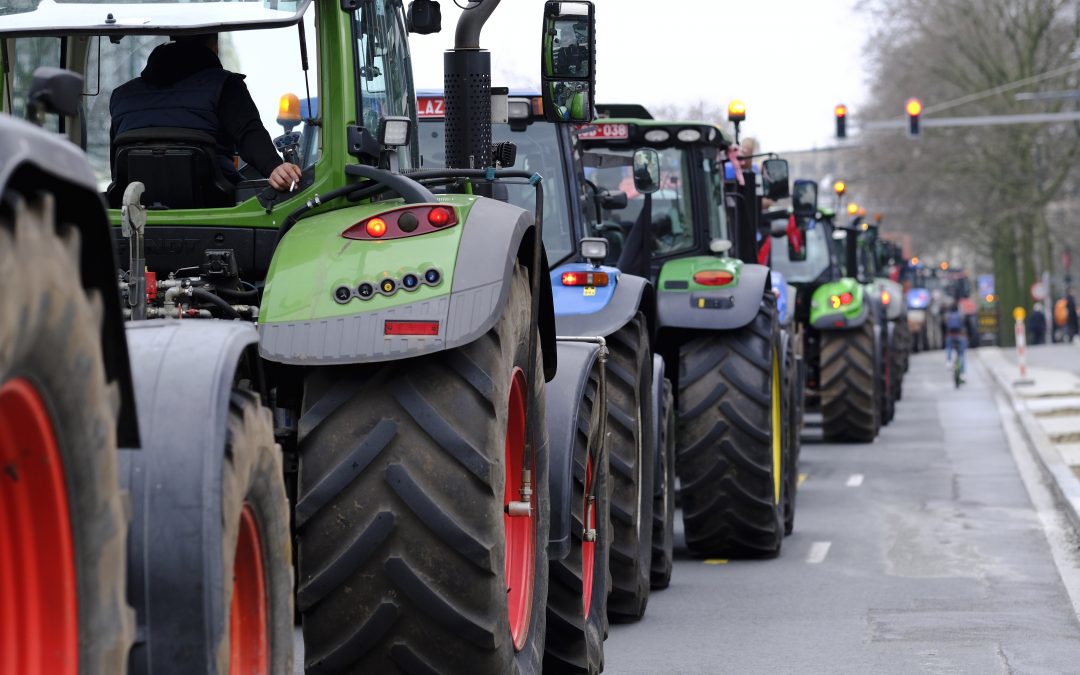
by Hefe Fertilizer | Mar 9, 2024 | NEWS
Agriculture is the backbone of our society, providing the food we consume on a daily basis. However, this vital sector faces constant challenges, and currently, farmers’ strikes are causing concern around the world. In times of uncertainty such as these, it is essential to have effective solutions that maximize crop yields and ensure food security. In this context, Hefe Fertilizer’s organic fertilizers emerge as indispensable allies for farmers in the quest for sustainable, high-quality agricultural production.
Farmer strikes represent a multifaceted challenge that affects the entire food supply chain. From labor shortages to transportation and distribution disruptions, farmers face significant obstacles that threaten the productivity and profitability of their crops. In this scenario, optimizing available resources becomes crucial, and Hefe Fertilizer’s organic fertilizers offer an effective and sustainable solution.
The key to meeting today’s challenges lies in improving soil health and increasing plant resistance to adverse conditions. Hefe Fertilizer’s organic fertilizers are designed to nourish the soil in a balanced way, providing the essential nutrients plants need to grow strong and healthy. By promoting soil biodiversity and stimulating beneficial microbial activity, these fertilizers improve soil structure, increase its water and nutrient holding capacity, and reduce erosion, thus contributing to crop resilience to extreme weather conditions and other stress factors.
In addition, Hefe Fertilizer’s organic fertilizers are a safe and environmentally friendly option, in line with increasing consumer demands and government regulations. Made from renewable organic raw materials, these fertilizers not only nourish plants effectively, but also promote long-term soil health without leaving harmful residues or polluting water resources.
In times of farmer strikes, operational efficiency and adaptability are crucial to maintain continuity of agricultural production. Hefe Fertilizer’s organic fertilizers offer a comprehensive solution that helps farmers overcome today’s challenges and reach their full productive potential. By investing in soil health and plant well-being, farmers can successfully meet the challenges of the present and build a more sustainable and prosperous agricultural future for generations to come.
In conclusion, at a time when agriculture faces unprecedented challenges, Hefe Fertilizer’s organic fertilizers stand out as an invaluable tool to maximize agricultural yields, promote sustainability and ensure food security. As a trusted partner committed to farmer success, Hefe Fertilizer continues to innovate and deliver solutions that drive progress and resilience in the field.

by Hefe Fertilizer | Jan 20, 2024 | NEWS
A technological leap that revolutionizes the way we farm. From automation to crop anticipation, we will explore how this evolution redefines agricultural efficiency.
The reality of agriculture has undergone a significant change thanks to the implementation of automated and digitized processes. The introduction of these Stage 3.0 practices has streamlined and modernized our approach to agricultural work, allowing us to leverage technological advances such as computer vision, machine learning, the Internet of Things (IoT) and sensor technology in agronomy. The abundance of data collected during this period has been staggering, exceeding our expectations.
We are now in a crucial transition to agriculture 4.0, marked by the maturation and advanced processing of the digital data obtained in the previous stage. This Big Data not only drives precision in production and yield applications, but also opens up new possibilities with emerging technologies such as quantum computing and Artificial Intelligence (AI) in the agri-food sector.
The shift from 3.0 to 4.0 agriculture redefines the initial paradigm of pursuing faster and more abundant agriculture. Now, it is about understanding that each piece of data collected contributes to fairly address the economic reality of the field, minimizing the use of agricultural applications and reducing the environmental impact.
The Age of Big Data
The figures collected since 2020 are shocking, surpassing all of human history in agricultural data collection. Projections indicate that these figures will triple by 2025, reflecting a quantitative and qualitative leap in the agricultural industry.
The information collected offers unprecedented accuracy, replacing estimates based on intuition and past experience. These data guide the correction of failures, the efficient allocation of resources at each stage and the accurate evaluation of successes in agricultural actions.
Optimization and Sustainability
Data guides us to anticipate crop results, allowing us to maximize production, reduce costs and mitigate environmental impact. Agriculture 4.0 distinguishes itself by doing more with less effort, optimizing yields and minimizing the use of inputs. Through the volatility of cycles, profitability is maintained.
In short, this data empowers agricultural stakeholders to make more effective decisions in the future, overcoming past practices and embracing an era of smarter, more sustainable agriculture.

by Hefe Fertilizer | Jan 20, 2024 | NEWS
In Mexico, HEFE brand products are notably prominent, thanks to its exclusive distributor, Polaquimia, part of the Polak Group, which is one of the world’s leading food suppliers.
Mexico, with a territory that is more than double the total land area of the countries of the Central American Integration System (SICA) bloc, stands out in agriculture with more than 21.2 million fertile hectares, making it the 11th largest agricultural producer in the world.
Mexico’s vast arable area also implies the need to protect it against threats such as climate change, uncontrolled deforestation, population growth, and financial and energy crises. These factors represent significant challenges that affect the country’s agricultural productive capacity.
CHALLENGE IN MEXICO
In Mexico, soil degradation and loss of organic matter have reached alarming levels in the last decade. This problem, common in countries with significant agricultural production, is due to the exponential increase in agricultural activity to meet high food demand. The widespread focus on farming without regard for conservation and the preference for mineral fertilizers have contributed to worsening soil health in this period.
In addition to rapid soil degradation, Mexico faces climatic and environmental conditions conducive to the proliferation of insect pests and fungal diseases.
Faced with soil degradation and challenging conditions, Mexican growers are looking to invest in plant health and plant nutrition solutions that are more innovative than traditional practices. The focus is on biotech products designed to induce physiological processes directly in the plant, as opposed to the direct application of mineral nutrients in the soil. In addition, opting for products with a high organic matter composition may be key to moving towards an agriculture that protects soil health and avoids soil non-viability over successive crop cycles.
Biosolutions in Mexico: adaptation with difficulties
The Mexican agri-food industry could experience enormous benefits from the promotion of and investment in biosolutions. Although there is significant technological adoption from Spanish, European and North American suppliers, demand in the country is not yet fully satisfied. Companies specializing in agricultural biosolutions, mainly biostimulants and bionutrients, face significant challenges in terms of slowness and costs in obtaining registrations for this type of products, with a validation period of 16 to 24 months and costs that can reach up to US$20,000 per product for analysis, studies and official registrations.



